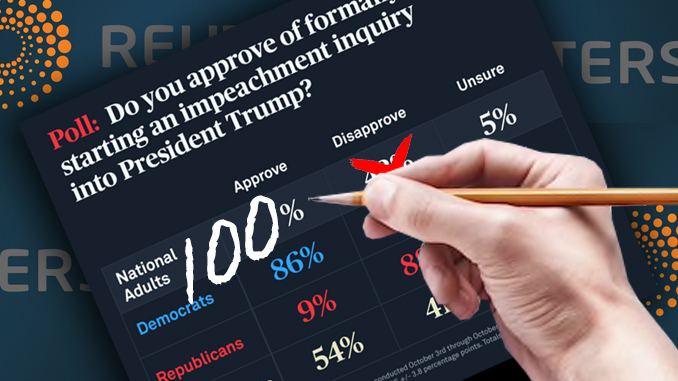
By S.T. Patrick
Fake news cannot always be classified as stories that are created from nothing. Quite often, there are facts from which the story is generated. More often, those same facts have been manipulated to create the story the journalist or media organization wanted to tell. In the case of coverage of an early December Reuters/Ipsos poll, the kneejerk headline was “Support for Impeachment Increasing.” The more telling story behind the headline is Reuters’s own methodology, however.
According to Reuters, “The result, combined with Reuters/Ipsos polling over the past several weeks, showed that the number of Americans who want to impeach the president increasingly outnumbers those who do not.”
In the competitive 24-hour news cycle, there is a tendency to push headlines to air. With ratings and billions of dollars of advertising revenues on the line, there is little time to read entire reports. When a new poll is released, no one is reading the explanation of method. Push the headline. That’s what the pollsters want (Gallup, Zogby, Reuters, et al. all get their names on the air, thus legitimizing them) and that’s what the news outlets want. In this case, what was lost was the fine print at the bottom of the report explaining the politically disproportionate pool of responders.
“The Reuters/Ipsos poll was conducted online, in English, throughout the United States,” the report explained. “It gathered responses from 1,118 adults, including 528 Democrats, 394 Republicans and 111 independents. It has a credibility interval, a measure of precision, of 3 percentage points.”
A quick summation of the math tells us that Reuters polled more Democrats than Republicans and Independents combined. A further explanation showed that the results are very much even, with nearly eight out of 10 Democrats supporting impeachment, while eight out of 10 Republicans oppose it. A few other recent polls have shown that support for impeachment has slightly decreased. It appears that Reuters was used as a corrector to an idea that cannot be allowed in the mainstream media—that impeachment is not wildly popular.
There is some reason to believe Reuters was a witting partner in this attempt to sway popular opinion. In 2016, Reuters was one of the news and polling organizations oversampling Democrats to show that Hillary Clinton had a considerable lead over Donald Trump. Reuters had oversampled Democrats 44% to 33%, which doesn’t sound like a large number. Yet, consider that in  presidential polling, anything above 3% is considered outside the margin of error. Therefore, an oversampling of 11% is significant.
presidential polling, anything above 3% is considered outside the margin of error. Therefore, an oversampling of 11% is significant.
There’s something wrong with polling, as the election of 2016 clearly showed. Some pollsters explained the severe errors (lack of accuracy) in 2016 polls by explaining that they didn’t weight the polls enough based upon the level of education of respondents. What the elitist pollsters are saying is that they hadn’t counted on all the uneducated people coming out to vote for Trump. It’s a typical take from a group of pollsters who surround themselves with the D.C. Beltway to protect them from the ills of the “flyover states.”
In a rare moment of clarity, CNBC and Wired magazine proposed that there are two other reasons the 2016 polling was so inaccurate compared to the final results.
“One theory is that a large majority of undecided voters decided to vote for Trump at the last minute,” wrote Jake Novak at “CNBC.com.” “Another is that Trump was and is supported by disaffected Americans who are very unlikely to respond to pollsters at all.” Novak calls these explanations “hard to fix or even prove.” Republics can often be tricky like that. Sometimes, voters do not vote for the media’s chosen candidate, which always leaves pundits and analysts with their hands raised and palms up, screaming “How?” Those they feel are “uneducated” could easily explain it to them in a way that even the MSM would understand. When you’re deemed a “deplorable” who “clings to their God and guns,” the average American typically does not support those candidates, their ideologies, or their pollsters.
Reuters will continue to join the other mega-pollsters and news organizations pushing the narrative that Trump is increasingly unpopular and losing his grip on whatever power he had within the party and country. They’ll have the numbers to prove it, no matter how they have to manipulate the method to “prove” their position. They cannot possibly fathom that any other narrative could be true.
S.T. Patrick holds degrees in both journalism and social studies education. He spent 10 years as an educator and now hosts the “Midnight Writer News Show.” His email is [email protected]. He is also an occasional contributor to TBR history magazine and the current managing editor of Deep Truth Journal (DTJ), a new conspiracy-focused publication available from the AFP Online Store.




